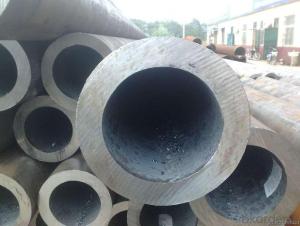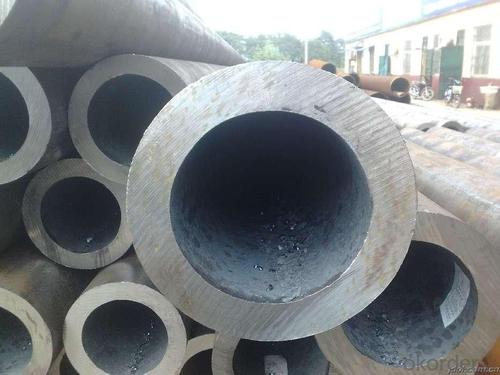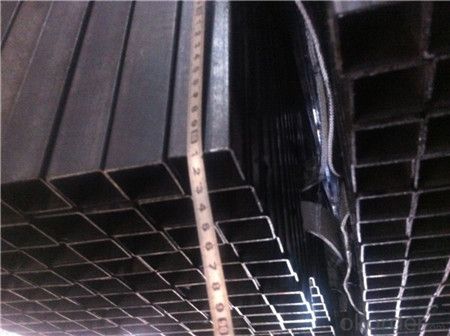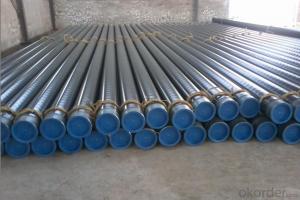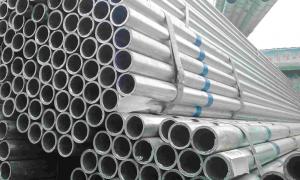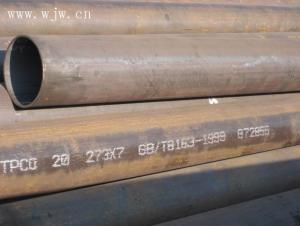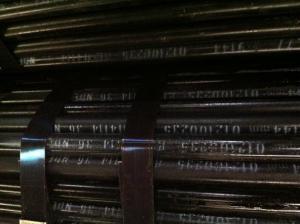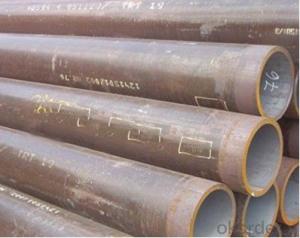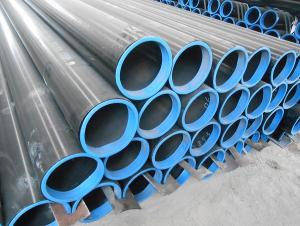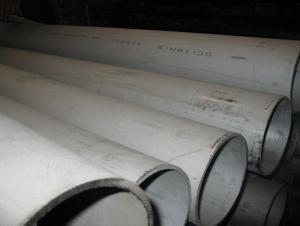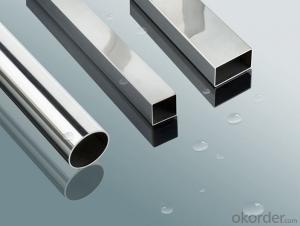Hot Rolled Large Diameter Thick Wall Seamless Carbon Steel Pipe
- Loading Port:
- Tianjin
- Payment Terms:
- TT or LC
- Min Order Qty:
- 20 m.t.
- Supply Capability:
- 15000 m.t./month
OKorder Service Pledge
OKorder Financial Service
You Might Also Like
1、Structure of Hot Rolled Large Diameter Thick Wall Seamless Carbon Steel Pipe:
Seamless pipe is formed by drawing a solid billet over a piercing rod to create the hollow shell. As the manufacturing process does not include any welding, seamless pipes are perceived to be stronger and more reliable. Historically seamless pipe was regarded as withstanding pressure better than other types, and was often more easily available than welded pipe.
2、Main Features of Hot Rolled Large Diameter Thick Wall Seamless Carbon Steel Pipe:
• High manufacturing accuracy
• High strength
• Small inertia resistance
• Strong heat dissipation ability
• Good visual effect
• Reasonable price
3、Hot Rolled Large Diameter Thick Wall Seamless Carbon Steel Pipe Specification:
Standard | GB, DIN, ASTM ASTM A106-2006, ASTM A53-2007 |
Grade | 10#-45#, 16Mn 10#, 20#, 45#, 16Mn |
Thickness | 8 - 33 mm |
Section Shape | Round |
Outer Diameter | 133 - 219 mm |
Place of Origin | Shandong, China (Mainland) |
Secondary Or Not | Non-secondary |
Application | Hydraulic Pipe |
Technique | Cold Drawn |
Certification | API |
Surface Treatment | factory state or painted black |
Special Pipe | API Pipe |
Alloy Or Not | Non-alloy |
Length | 5-12M |
Outer Diameter | 21.3-610mm |
Grade | 20#, 45#, Q345, API J55, API K55, API L80, API N80, API P110, A53B |
Standard | ASME, ASTM |
1) Material:20#(ASTM A 106/A53 GRB.API5LGRB,GB),45#,16Mn,10#.
2) Specification range:OD:21.3-610mm,WT:6-70mm,length:6-12m or according to the requirement of clients.
3) Excutive standards:GB,ASME API5L.ASTM A 106/A53,Despite of the above standards,we can also supply seamless steel pipe with standard of DIN,JIS,and so on,and also develop new products according to the requirements of our clients!
4) Surface:black lacquered,varnish coating or galvanized.
5) Ends:Beveled or square cut,plastic capped,painted.
6) Packing:bundles wrapped with strong steel strip,seaworthy packing.
4、Packaging & Delivery
Packaging Details: | seaworthy package,bundles wrapped with strong steel strip |
Delivery Detail: | 15-30days after received 30%TT |
5、FAQ of Hot Rolled Large Diameter Thick Wall Seamless Carbon Steel Pipe:
①How is the quality of your products?
Our products are manufactured strictly according to national and internaional standard, and we take a test
on every pipe before delivered out. If you want see our quality certifications and all kinds of testing report, please just ask us for it.
Guaranteed: If products’ quality don’t accord to discription as we give or the promise before you place order, we promise 100% refund.
②How about price?
Yes, we are factory and be able to give you lowest price below market one, and we have a policy that “ for saving time and absolutely honest business attitude, we quote as lowest as possible for any customer, and discount can be given according to quantity”,if you like bargain and factory price is not low enough as you think, just don’t waste your time.Please trust the quotation we would give you, it is professional one.
③Why should you chose us?
Chose happens because of quality, then price, We can give you both.Additionally, we can also offer professional products inquiry, products knowledge train(for agents), smooth goods delivery, exellent customer solution proposals.Our service formula: good quality+good price+good service=customer’s trust
SGS test is available, customer inspection before shipping is welcome, third party inspection is no problem.
6、Hot Rolled Large Diameter Thick Wall Seamless Carbon Steel Pipe Images:
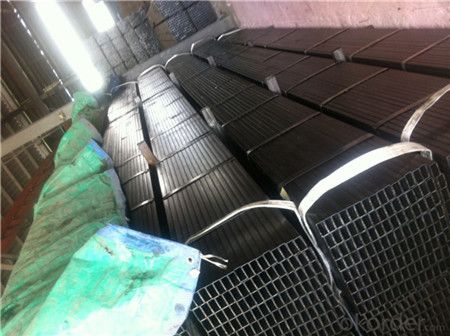
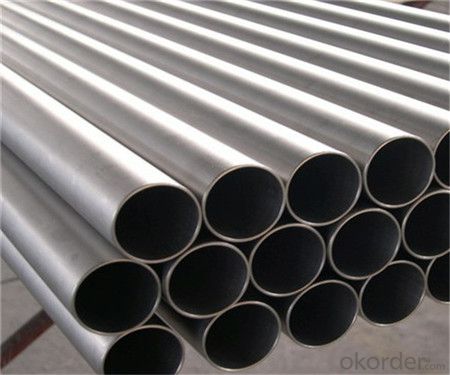
- Q: What is the difference between carbon steel and stainless steel pipes?
- The main difference between carbon steel and stainless steel pipes lies in their composition and rust resistance properties. Carbon steel pipes are primarily made of iron and carbon, making them less resistant to corrosion and prone to rusting. On the other hand, stainless steel pipes contain chromium, which gives them excellent rust resistance and durability. This makes stainless steel pipes ideal for use in environments where corrosion is a concern, such as in plumbing systems and industrial applications.
- Q: What are the advantages of using pre-fabricated steel pipes?
- Using pre-fabricated steel pipes in various applications has several advantages. Firstly, these pipes offer a high level of durability and strength due to the robustness and resistance of steel to external forces. This makes them ideal for withstanding high pressure or heavy loads, resulting in a longer lifespan compared to other materials and reducing the need for frequent replacements and maintenance. Secondly, pre-fabricated steel pipes provide excellent corrosion resistance by being coated with protective layers like galvanization or epoxy, preventing rusting and corrosion. This is especially important in industries or environments where the pipes may come into contact with moisture, chemicals, or other corrosive substances. By utilizing pre-fabricated steel pipes, the risk of leaks, deterioration, or failure due to corrosion is significantly reduced. Another advantage of these pipes is their versatility and ease of installation. They are manufactured to precise specifications before being delivered to the site, allowing for quick and efficient installation. Their modular nature enables easy assembly, disassembly, and reconfiguration, making them suitable for a wide range of applications. Additionally, pre-fabricated steel pipes can be seamlessly integrated with other building components, reducing installation time and costs. Furthermore, pre-fabricated steel pipes are more environmentally friendly compared to other materials. Steel is highly recyclable, and using pre-fabricated pipes reduces the consumption of natural resources and energy required for production. The long lifespan of steel pipes also reduces waste generation and the need for frequent replacements, contributing to sustainability efforts. Lastly, pre-fabricated steel pipes offer cost advantages. Although the initial cost may be higher than some other materials, their durability and low maintenance requirements result in long-term cost savings. The reduced need for repairs, replacements, and maintenance, along with the ease of installation, lead to lower overall project costs and reduced downtime. In summary, the advantages of pre-fabricated steel pipes include durability, corrosion resistance, versatility, ease of installation, environmental friendliness, and cost-effectiveness. These benefits make them the preferred choice for various industries and applications.
- Q: How are steel pipes protected against soil movement?
- Steel pipes are protected against soil movement through the use of various techniques such as trenching, backfilling, and proper installation of support structures. Additionally, protective measures like the use of casing pipes or concrete encasement can be employed to prevent direct contact with the soil and minimize the impact of soil movement on the steel pipes.
- Q: How do steel pipes handle water erosion?
- Steel pipes are highly resistant to water erosion due to their robust and durable nature. The smooth surface of steel pipes minimizes the formation of rust and corrosion, preventing water erosion from occurring. Additionally, steel pipes can withstand high water pressure and turbulent flow, further enhancing their ability to handle water erosion effectively.
- Q: Can steel pipes be used for underground sprinkler systems?
- Yes, steel pipes can be used for underground sprinkler systems. Steel pipes are known for their durability and strength, making them a suitable choice for underground applications. They are resistant to corrosion and can withstand high pressure and temperature, making them suitable for delivering water to sprinkler heads. However, it is important to note that steel pipes may require additional coatings or protective measures to prevent rusting and corrosion over time. Additionally, steel pipes may be more expensive than other materials such as PVC or polyethylene, so the cost factor should be considered as well. Overall, steel pipes can be a viable option for underground sprinkler systems, particularly in areas with harsher environmental conditions.
- Q: Are steel pipes suitable for pharmaceutical manufacturing facilities?
- Indeed, steel pipes prove to be a fitting option for pharmaceutical manufacturing facilities. Their outstanding resistance to corrosion and durability make them a prevalent choice in this industry. They are capable of enduring high levels of pressure and temperature, rendering them perfect for a wide range of purposes, including fluid, gas, and chemical transportation within the facility. Moreover, steel pipes possess the advantage of effortless cleaning and sanitization, guaranteeing the preservation and safety of pharmaceutical products. Additionally, they offer cost-effectiveness and boast an extended lifespan, solidifying their status as a dependable choice for pharmaceutical manufacturing facilities.
- Q: What is the load-bearing capacity of steel pipes?
- The load-bearing capacity of steel pipes is influenced by a range of factors, including diameter, wall thickness, and steel grade. In general, steel pipes exhibit excellent load-bearing capacity due to their inherent strength and durability. The determination of load-bearing capacity involves utilizing engineering calculations and testing techniques. These calculations take into account factors such as the applied load, pipe dimensions, and material properties of the steel. To accurately ascertain the load-bearing capacity of specific steel pipes for a particular application, it is crucial to refer to engineering standards, guidelines, and consult with a structural engineer.
- Q: How are steel pipes used in agriculture?
- Steel pipes are commonly used in agriculture for a variety of purposes, such as irrigation systems, water supply lines, and drainage systems. These pipes are durable, resistant to rust and corrosion, and can withstand high pressure, making them ideal for transporting water and other fluids across farmland. Additionally, steel pipes are used to construct structures like greenhouses, fencing, and livestock enclosures, providing strength and stability to support agricultural operations.
- Q: How are steel pipes used in oil refineries?
- Steel pipes are used extensively in oil refineries for various purposes, such as transporting crude oil, petroleum products, and chemicals throughout the facility. They are also used in the construction of equipment, such as distillation columns and heat exchangers, where they provide a reliable and durable means of transferring fluids and withstanding high temperatures and pressures.
- Q: What are the factors affecting the price of steel pipes?
- The price of steel pipes can be influenced by various factors. These factors encompass: 1. Raw material expenses: The cost of raw materials like iron ore and coal significantly influences the price of steel pipes. Fluctuations in commodity prices can impact the overall production cost and subsequently affect the selling price. 2. Supply and demand dynamics: The price of steel pipes is determined by the interplay of supply and demand. When there is high demand and limited supply, prices tend to rise. Conversely, an oversupply and low demand can lead to price decreases. 3. Production and manufacturing costs: The direct impact of production and manufacturing expenses on steel pipe prices cannot be overlooked. Costs related to labor, energy, transportation, and equipment maintenance all contribute to the overall production cost and, consequently, the selling price. 4. Market competition: The level of competition within the steel pipe industry also influences prices. Increased competition among manufacturers and suppliers can result in more competitive pricing. Conversely, fewer competitors may lead to higher prices due to limited options. 5. Government policies and regulations: Government policies and regulations exert a significant influence on steel pipe prices. Import tariffs, trade restrictions, and environmental regulations can all affect production costs and subsequently impact prices. 6. Currency exchange rates: Currency exchange rates can also sway steel pipe prices. Fluctuations in exchange rates between countries can impact the cost of importing or exporting steel pipes, which in turn affects their selling price. 7. Global economic conditions: The overall state of the global economy can have repercussions on steel pipe prices. During periods of economic growth, demand for steel pipes may increase, leading to higher prices. Conversely, economic downturns can result in decreased demand and subsequently lower prices. It is vital to acknowledge that these factors can interact and fluctuate over time, making the pricing of steel pipes a complex and ever-changing process.
Send your message to us
Hot Rolled Large Diameter Thick Wall Seamless Carbon Steel Pipe
- Loading Port:
- Tianjin
- Payment Terms:
- TT or LC
- Min Order Qty:
- 20 m.t.
- Supply Capability:
- 15000 m.t./month
OKorder Service Pledge
OKorder Financial Service
Similar products
Hot products
Hot Searches
Related keywords
